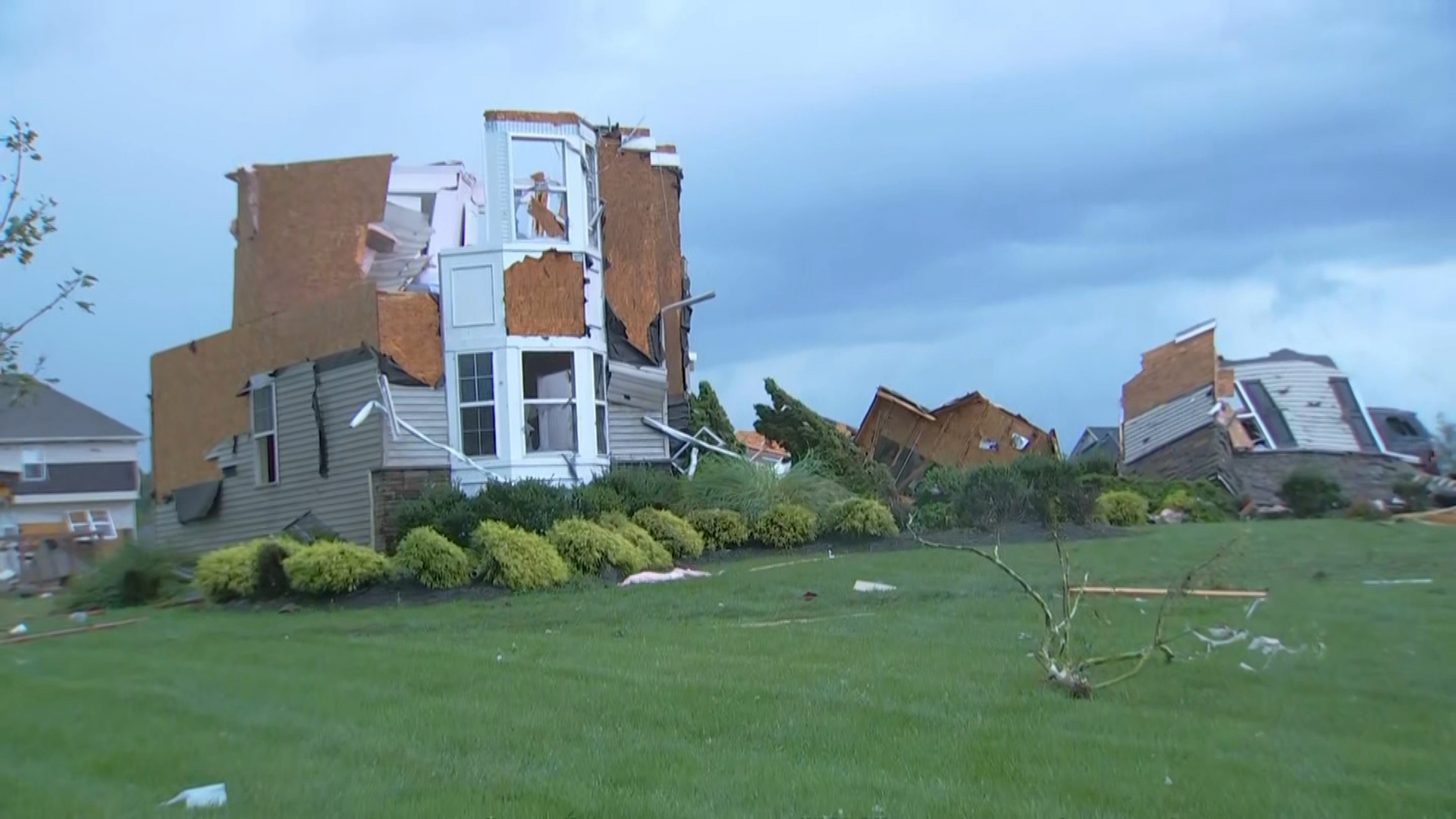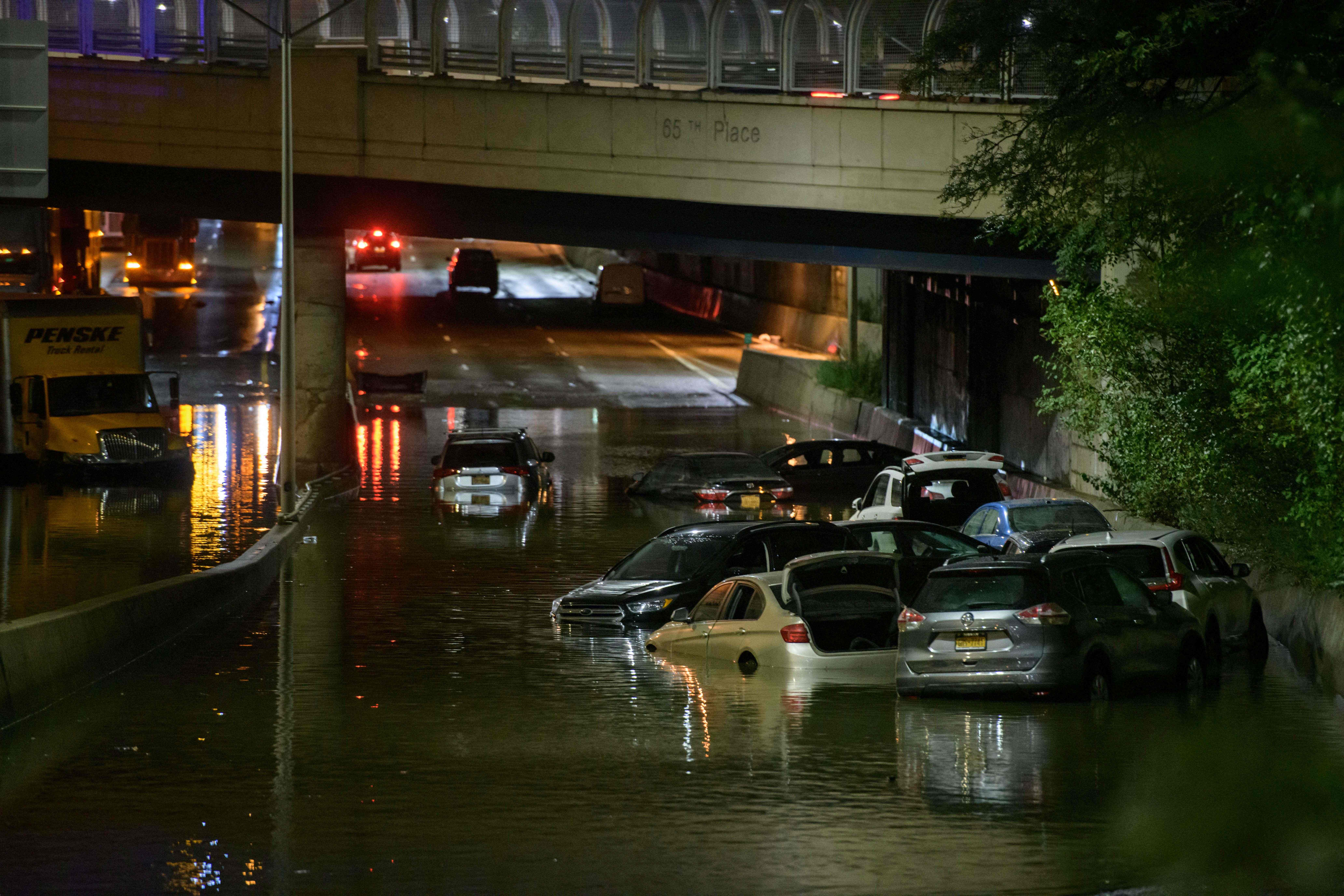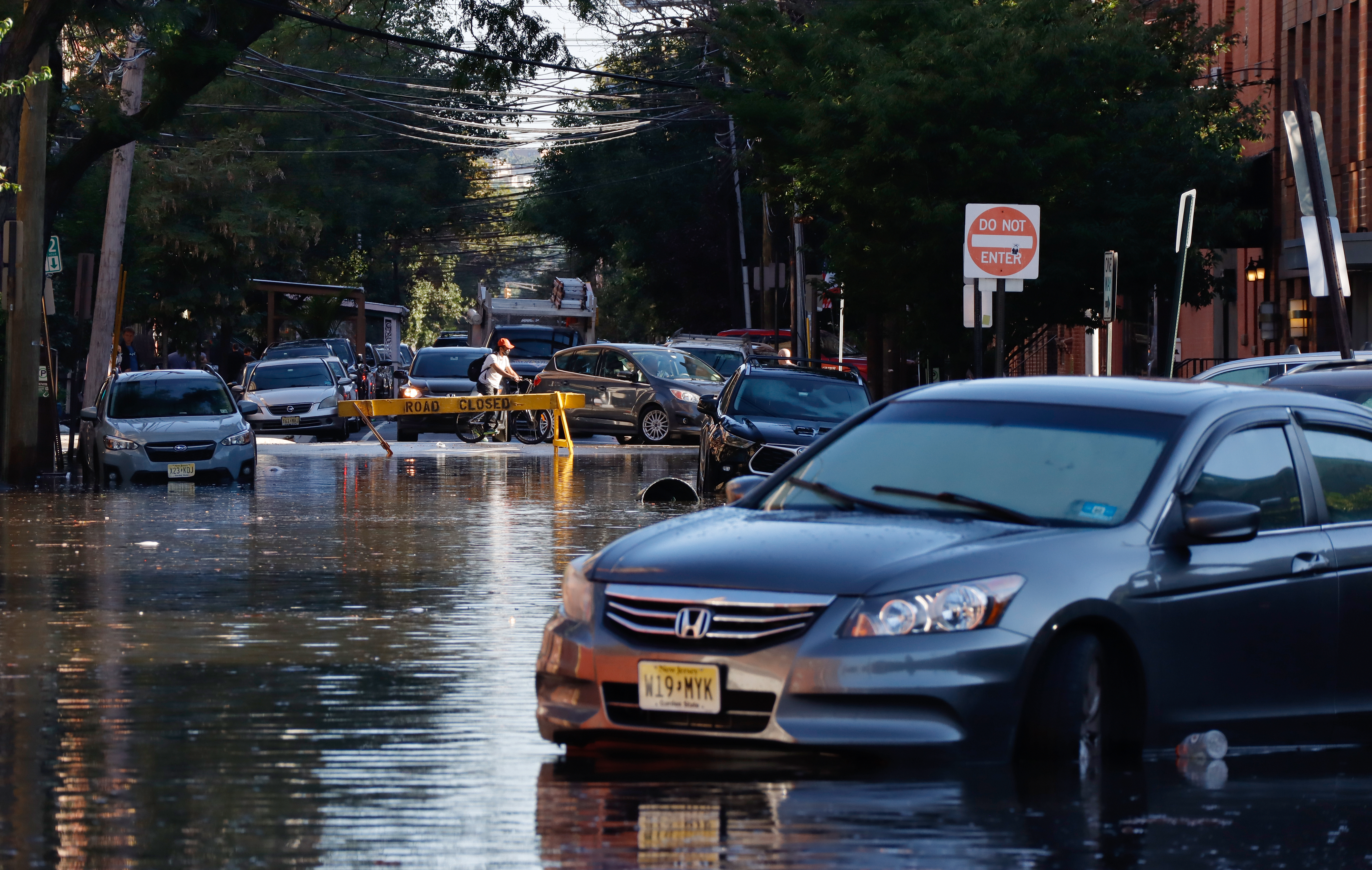The deadly remnants of Hurricane Ida turned catastrophic as it advanced through the tri-state area -- converting major highways into streams, flooding subways and streets and triggering states of emergency in New York and New Jersey.
At least 43 people died, including a New York City toddler, and tens of thousands were overwhelmed by floods that ravaged the tri-state area with historic rainfall, half a dozen tornadoes and savage winds.
Scroll down to see how to receive assistance as well as how to help others in the aftermath of the devastation caused by Ida's wrath:
STATE RESOURCES
Get Tri-state area news and weather forecasts to your inbox. Sign up for NBC New York newsletters.
Both New York and New Jersey are directly working with individuals and small businesses impacted by Ida. They have established information portals where you can learn about financial assistance options, access to basic needs and more.
If you live in New York, click here.
If you live in New Jersey, click here.
SUPPORT THE RESPONSE
The American Red Cross is responding to the communities hardest hit by the storm. You can support their efforts by making a financial donation or volunteering your time.
To donate to the Red Cross, click here
To volunteer with the Red Cross, click here.
FEED THOSE IN NEED
Our tri-state food banks are our primary emergency food suppliers during times of crisis. They supply the resources to local food pantries and service agencies.
You can help by texting the word FOOD to 707070, where you will receive a mobile-friendly, Apple Pay-compatible link to donate to our local food banks. Note that processing fees will be deducted from your mobile donation unless you choose to cover those costs.
With community need already at record levels and many food banks facing a loss of volunteers, food banks have been forced to rely on financial donations to restock shelves, deliver shelf-stable goods to families and keep the emergency food chain stable.
For a county-by-county listing of food banks serving the area, click here.
The Tri-State’s regional food banks are the distribution hub for many local pantries and community-non-profits, all of whom deliver nutritious food to those in need. They need financial donations to help restock their shelves, particularly with pre-packaged items that can be easily distributed to those in need.
For more information and to donate, visit:
New York City: Food Bank for New York City
Long Island: Island Harvest, Long Island Cares
Northern New Jersey: Community Food Bank of New Jersey
Monmouth and Ocean Counties: Fulfill NJ
Fairfield County: Connecticut Food Bank
Westchester County: Feeding Westchester
Rockland, Orange, Putnam, Dutchess, Ulster and Sullivan Counties: Food Bank of the Hudson Valley
KEEP INFORMED WITH EMERGENCY ALERTS
New York: https://alert.ny.gov/
New Jersey: http://www.ready.nj.gov/
Connecticut: ct.gov/ctalert
EMERGENCY SERVICES
CATHOLIC CHARITIES
Provides emergency services including shelter, clothing and more social services regardless of religion or immigration status.
Email: catholiccharities@ccannj.org
Catholic Charities of Trenton: 1-800-360-7711
Catholic Charities of the Archdiocese of Newark: 973-596-4100
Catholic Charities of Paterson: (973) 737-2077, info@ccpaterson.org
Catholic Charities Archdiocese of NY: (888) 744-7900
Catholic Charities of Brooklyn & Queens: (718) 722-6001
Catholic Charities of Staten Island: (718) 984-1500
RED CROSS
Northern New Jersey: (973) 797-3300
Phillipsburg: (201) 832-9953
Red Cross – New York
American Red Cross - Greater New York: (877) 733-2767
American Red Cross - Long Island: (516) 747-3500
American Red Cross - Metro NY North: (203) 869-8444
LOSS/DAMAGE OF PROPERTY
NYS DEPARTMENT OF FINANCIAL SERVICES
DFS Disaster Hotline helps with insurance-related issues: 800-339-1759
NJ DEPARTMENT OF FINANCIAL SERVICES: 1-800-446-7467
FEMA DISASTER ASSISTANCE: FEMA’s Disaster Assistance Improvement Program provides aid to homeowners, renters and business owners who have experienced significant damage to their property after a disaster.
1-800-621-FEMA (1-800-621-3362)
Disaster Assistance Website: https://www.disasterassistance.gov/
HELP FOR SMALL BUSINESSES IN NJ
Gov. Phil Murphy announced Friday the preliminary details of a proposed plan to provide grants to New Jersey small businesses impacted by severe weather caused by Tropical Storm Ida on Wednesday and early Thursday.
The New Jersey Economic Development Authority (NJEDA)has been tasked with creating and administering the program, which will provide short-term, immediate rent/mortgage reimbursement support to New Jersey businesses and non-profits with up to 50 employees that suffered physical damage on Sept.1 and 2, and any additional flooding immediately thereafter.
Through the proposed $10 million grant program, small businesses and non-profit entities with up to 50 employees will be able to apply for grants of $1,000 to $5,000 dollars. Landlords and home-based businesses are not eligible for grant funding through this program. Under the preliminary plan, to be eligible, the applying entity must:
- Provide certification of an unmet need due to damage and/or business interruption
- Provide documentation of physical damage to the applicant’s physical commercial location
- Present a valid Employer Identification Number (EIN)
- Submit recent wage reporting form (WR30), if applicable
- Be registered to do business in the State of New Jersey
- Be in good standing with the Department of Taxation
- Additional requirements may apply
As proposed, grants will be provided in the form of reimbursement of August rent or mortgage ($1,000 min rent eligibility).
The proposed program will be presented to the NJEDA’s Board for consideration of approval at a special meeting on Wednesday, Sept. 8. If approved, the NJEDA expects to announce full details and the application timeline for the grant program following that meeting.
DONATE BLOOD
Prior to today, major Tri-State blood banks are reporting significant blood shortages and asking the community for help, particularly with the impact of the COVID-19 Delta Variant on the rise.
Donating blood takes approximately one hour of time. The blood and platelets donated are quickly distributed to hospitals in your community – helping your friends and neighbors most in need.
To find the nearest blood donation site near you, visit:
EMOTIONAL SUPPORT
If you need someone to talk to:
- In New York, residents can call the NY Project Hope Emotional Support Helpline at 1-844-863-9314. The call is free, confidential and offered as part of the FEMA response to COVID-19.
- In New Jersey, residents can contact NJ Mental Health Cares at 1-866-202-HELP (4357) for free, confidential support. The service is offered through NJ Human Services’ Division of Mental Health and Addiction Services and the Mental Health Association of New Jersey (MHANJ).
- In Connecticut, adults in need who are 18 years old or older can call the ACTION help line at 1-800-HOPE-135 (1-800.467.3135). ACTION counts on the help of multilingual staff to attend to the needs of those who do not speak English. Children under the age of 18 can call 211.
What else can you do?
Open Your Home to a Homeless Pet
This is the time of the year where our animal shelters and rescues are often at their highest capacity due to spring litters. However, the lingering impact of the pandemic has led to continued operating restrictions and volunteer reductions – while the day-to-day needs of our furry friends have only grown. The need to place homeless pets into forever homes has never been greater.
During this time, NBC 4 New York and Telemundo 47 are partnering with dozens of local animal shelters and rescues to connect loving families with dogs, cats and other domestic animals throughout the Tri-State area. Through our Clear the Shelters campaign, you can view available pets from the comfort of your home, make an appointment with a shelter or rescue – and complete the adoption process on your own timeline.
Visit ClearTheShelters.com to get started today.
You can also help by making an on-line donation to local animal shelters and rescues. Visit Greater Good Charities’ donation site at ClearTheSheltersFund.org.
POWER OUTAGE CONTACT NUMBERS
Atlantic City Electric – 800-833-7476
Con Edison – text REG to OUTAGE (688243) for outage updates
EverSource – 800-286-2000
JCP&L – 888-544-4877
Orange Rockland – 877-434-4100
PSEG – 800-436-7734
PSEG Long Island 1-800-490-0075
National Grid – 1-800-867-5222
Vineland Municipal – 856-794-4280
United Illuminating Company – 800-722-5584
Norwich Public Utilities – 1-860-877-2555
Groton Utilities –1-860-446-4000
GAS COMPANY CONTACT NUMBERS
Cox: 1-877-832-7658
Elizabethtown Gas: Main number is 1-800-242-5830; To report a gas leak call 1-800-492-4009
Frontier: 1-800-921-8101
New Jersey Natural Gas: Main number is 1-800-221-0051; To report a gas leak call 1-800-427-5325
PSEG: Main number is 1-800-436-7734; To report a gas leak call 1-800-436-7734
South Jersey Gas: Main number is 1-888-766-9900; To report a gas leak call 1-800-582-7060
National Grid: Main number is 1-800-642-4272; To report a gas leak call 1-800-892-2345
SOCIAL MEDIA ACCOUNTS TO FOLLOW
FEDERAL AGENCIES
@FEMA: Federal Emergency Management Agency
CONNECTICUT
STATE AGENCIES
@GovNedLamont: Office of Governor Lamont
@CTDEMHS: Connecticut Division of Emergency Management and Homeland Security
@CT_STATE_POLICE: Connecticut State Police
@CIDNews: Connecticut Insurance Department
UTILITY COMPANIES
@EversourceCT: Eversource Connecticut
@UnitedIllum: United Illuminating
OTHER AID SERVICES
@CTRedCross: Connecticut Red Cross
@FEMARegion1: FEMA Region 1 (serves CT)
NEW JERSEY
STATE AGENCIES
@GovMurphy: Governor Phil Murphy
@LtGovOliver: NJ Lt. Governor Sheila Oliver
@NJGov: NJ Government
@NJTransit: NJ Transit
@NewJerseyDOT: NJ Department of Transportation
@ReadyNJ: NJ Office of Emergency Management
@NJSP: NJ State Police Public Information Unit
@NJInsurFraud: NJ Office of the Insurance Fraud Prosecutor
NJ UTILITY COMPANIES
@PSEGdelivers, @PSEGNews: PSEG
@ORUConnect: Orange & Rockland
@ACElecConnect: Atlantic City Electric
@JCP_L: JCP&L
@etowngas: Elizabethtown Gas
@southjerseygas: South Jersey Gas
@NJNaturalGas: NJ Natural Gas
OTHER AID RESOURCES
@femaregion2: FEMA Region 2 (serves NJ & NY)
@NJRedCross: Red Cross NJ
NEW YORK
STATE AGENCIES
@GovKathyHochul – Governor Kathy Hochul
@nygov – New York State’s Official Twitter Account
@NYSDHSES – New York State Homeland Security & Emergency Services
@nyspolice – New York State Police
@NYSDOT – New York State Department of Transportation
@NotifyNYC – NYC official emergency notification system
@NWSNewYorkNY – National Weather Service of New York, NY
@MTA – MTA
UTILITY COMPANIES
@PSEGLI – PSEG Long Island
@ConEdison – ConEdison
@NationalGridUS – National Grid
OTHER AID RESOURCES
@FEMARegion2 – FEMA Region 2 (serves NY and NJ)
@RedCrossNY – Red Cross NY
STATE EMERGENCY MANAGEMENT LINKS
CONNECTICUT
Connecticut Office of Emergency Management
Department of Emergency Services and Public Protection (DESPP): 1-860-685-8190 and 1-800-842-0200
Connecticut 211: Connecticut 211 provides informational services to the public during disasters. Residents are urged to call 211 if you need help finding specific resources or basic information before, during, and after a disaster. Additionally, resources are available on the Connecticut 211 website, click here for more information.
NEW JERSEY
New Jersey Office of Emergency Management
NEW YORK
New York Office of Emergency Management
State Watch Center (24/7): 518-292-2200
IMPORTANT TIPS
USE GENERATORS SAFELY
In most cases, a generator is used to run a few household items during a temporary power outage. When using a generator:
- Do not overload your generator. Read and follow wattage guidelines in your owner’s manual.
- Use a grounded, outdoor-rated extension cord for connections to the generator.
- Be sure to connect individual appliances to the receptacle outlet of the generator. Follow the owner’s manual instruction and use the generator as intended.
- Do not back feed the generator into a regular, indoor outlet. This creates numerous dangers, including fire.
- Again, do not operate portable generators in any enclosed area, such as a garage, basement or porch. Operate the device as far away from the house as possible. Avoid placement within any proximity to vents, doors or windows.
USE CANDLES CAREFULLY
During a power outage, use of battery powered lamps and flashlights are the safest option for emergency lighting.
If you need to use candles, use extreme caution. The National Candle Association has prepared a series of tips which include not using candles as a search light or night light. You should also ensure candles are always attended and out of the reach of children and pets. A complete list of tips can be accessed here.
AVOID CARBON MONOXIDE POISONING
The risk of Carbon Monoxide poisoning rises during power outages. There are several steps you can take to avoid exposure to this odorless, colorless and deadly gas.
- Endure that a working carbon monoxide detector is installed on each floor of your residence near sleeping areas. Test each device ensure that it is operating properly. Batteries should be replaced twice per year.
- Do not operate portable generators in any enclosed area, such as a garage, basement or porch. Operate the device as far away from the house as possible. Avoid placement within any proximity to vents, doors or windows.
- Do not use stoves to generate heat. Do not leave oven doors open or boil water for extended periods of time. When using stoves during a power outage, ensure that the room is well ventilated.
- Do not run cars or any other gasoline powered equipment within garages or other enclosed areas. Ensure that any operation is done outdoors with full ventilation.
- Know the symptoms of Carbon Monoxide poisoning. They include headache, fatigue, dizziness, nausea or vomiting, and loss of consciousness. Leave your premises and seek medical help if you or a family member experience these.
ABOUT FLOODED BASEMENTS
Basement flooding can create any number of problems ranging from mold and bacteria growth to electric shock and more. Before taking steps to remediate the situation:
- Ensure that the space is safe to enter. If it is not - do not.
- If you can safely access the space, document the damage and take photos for any potential insurance claims.
- If you need to pump excess water out, ensure that a pump is safely attached to a grounded extension cord. If the grounded extension cord is attached to a generator, ensure that the generator is as far away from the house as possible and not in an enclosed area. Avoid placement within any proximity to vents, doors or windows.
- Each basement is different and the impact to an unfinished basement will usually greatly vary to that of a finished basement.
- Rugs, padding upholstery and walls/sheetrock will often need a more extensive clean up to avoid mold and bacteria build up. Consider consultation with a professional regarding any potential options for restoration and salvaging.
INSURANCE QUESTIONS
It is important to review your insurance policy to see if your specific property damage is covered by your policy.
- Many homeowner policies do not include flood protection in their standard coverage.
- Flood insurance is usually offered through the federal National Flood Insurance Program or through a private insurer.
- Some policies do include coverage for wind damage or for the impact of hurricanes. These are often reflected with a specific deductible in your policy.
- If you have specific questions, contact your local insurance agent.




